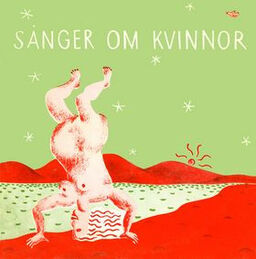
Sånger Om Kvinnor
Vinyl · Svensk · utgitt 1971 · Viser
Ledig
Sølvberget, 3. etasje Musikk: 1 av 1 ledig
Plassering: LP-plater (sortering: q SÅN)
Plassering: LP-plater (sortering: q SÅN)
Henter eksemplarliste...
Fakta
Laster innhold...
Kopiér til utklippstavle
*0010924902 *007s *008231020 swe *009 cj *019 $bda,dg *024 #$cNkr 350 *028 0$aMNW 23P$bMNW *035 $a(NO-LaBS)21730188(bibid) *090 $bq$dSÅN *24510$aSånger Om Kvinnor$hlydopptak *264#1$as.l$bMNW$c1971 *300 #$a1 LP$eGrammofonplate *336 #$aframført musikk *337 #$alydmedier *338 #$alydplate$0http://rdaregistry.info/termList/RDACarrierType/1049 *500 #$aSwedish music album released 1971. It was not an artist or music group that released the album, but it was a collective project among members of Group 8 with the aim of releasing an album recording with songs about women's conditions and everyday life. The project began as a play, Tjejsnack, written by Suzanne Osten and Margareta Garpe for Stockholm City Theater. The play toured around youth centers in Stockholm's suburbs. The record label wanted to make an entire album, but the songs from Tjejsnack would not be enough. A total of three songs from Tjejsnack were included: "Det var en gång en kille som ville", "Du kan bli på smällen" and "Vi måste höja våra röster", but for the remaining tracks several other songwriters were included, including the poet Sonja Åkesson, Louise Waldén and Leif Nylén. The ambition of the album was to portray the fate of women in 1970s Sweden, and the textual content ranges from being personal to explicitly political. A large number of women also took turns singing on the record, including Dramaten actress Ulla Sjöblom and Marie Selander. However, the music was written by men, in most cases Gunnar Edander. All the musicians who appeared on the record were also men, taken from groups such as the Blå Tåget and Gläns Över Sjö & Strand, something Songs about women had to endure criticism for. Gunilla Thorgren was dissatisfied with this and thought that it should be possible to make a women's record with only women, while Suzanne Osten thought that it was not possible to get hold of female composers and musicians. The album was re-released on LP and CD in 2009. The LP version had the same song list as the original, while the CD version was slightly shortened and contained only twelve songs (instead of the original's seventeen). Several of the songs are also included on a compilation album called Sånger om kvinnor, where other groups such as the Nationalteatern and Röda Bönor also participate. The album was awarded a Grammy in 1972. The cover was designed by Gittan Jönsson. *5050#$aInnhold: Vi Är Många ; Också Du ; Innerst Inne Är Du En Riktig Kvinna, Louise ; Den Ensamma Mamman I Traversen ; Där Fruarna Bo ; Vaggsång ; Kvinnorna I Hagen ; Ellen Sa Nej ; Eva Maria Andersson, 41 ; Sommarens Sista Krusbär ; Skyffla Hit Hela Berget Får Du Se ; Törnrosa ; Ska Bli Sjuksyster Jag, Tralala ; Vi Tror På Kärleken ; Det Var En Gång En Kille Som Ville ; Du Kan Bli På Smällen ; Vi Måste Höja Våra Röster *511 #$aBass, Guitar, Piano – Tord Bengtsson Congas – Hans Wiktorsson Drums – Sam Ellison Drums, Congas – Bengt Berger Drums, Congas, Bells – Leif Nylén Electric Piano, Zither – Gunnar Edander Flute, Saxophone, Electric Piano – Roland Keijser Flute, Saxophone, Violin, Guitar – Kjell Westling Guitar – Odd Wallmark Violin, Cello, Bass – Urban Yman Vocals – Anna-Lisa Bäckman, Gittan Jönsson, Jane Friedmann, Lena Söderblom, Liselotte Nilsson, Lottie Ejebrant, Louise Waldén, Margareta Garpe, Marie Selander, Sonja Åkesson, Suzanne Osten, Ulla Sjöblom, Wava Stürmer *592 $ainnleveringssjekk$_30164100 *650 0$aFeminisme$_10530900 *650 0$aKvinnekamp$_19771300 *655 0$aViser$zSverige$_35578300 ^